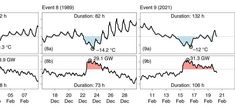Texas blackout deciphered with the aid of environmental statistics
In February 2021, a cold snap over Texas caused power outages and millions of people were affected by a prolonged blackout.
In a study recently published in the renowned journal Nature Energy, BOKU researchers from the Institute of Statistics and the Institute for Sustainable Economic Development investigated whether the blackout in Texas was unpredictable due to the extreme cold, or could have been prevented by anticipatory risk management. To do this, the researchers performed a reanalysis of weather events over the past 70 years to identify power outages that would have occurred based on current conditions.
"Through the innovative application of extreme value statistics methods originally developed in low-flow hydrology that we had used to classify the drought events of 2003 and 2015 across Europe, we were able for the first time to assess the probability of occurrence of the Texas blackout event," said environmental statistician and low-flow expert Gregor Laaha of the Institute of Statistics at BOKU.
"As with low flow events, the duration, shortfall volume and peak value of the deficit event were examined, except that instead of runoff deficits, energy production deficits were now assessed. For this, we were able to use our 'lfstat' software package, developed in-house for WMO and UNESCO, to determine the return period ("annuality") of the Texas Blackout event and the meteorological event factors."
The results show that the Texas Blackout was extreme, but not unpredictable. The 2021 event was the second longest freeze event in seven decades. It has an annuality of 37 years. However, other events were colder (1951, 1989) or had higher freeze totals (1951, 1983).
"It may sometimes be assumed that extreme frost events are decreasing due to global warming. However, our analysis for Texas does not reveal a significant trend in extreme deficit or frost events, as is the case in other regions of the northern hemisphere. Thus, global temperature increases due to climate change cannot be invoked to downplay a lack of investment in energy security. Viewed in this light, the Texas blackout could very well have been preventable on its magnitude. As our co-authors at the Institute for Sustainable Economic Development have shown, there are high costs involved, but they are paying off in light of energy prices."
The ball is now in the court of Texas energy policy, which must learn from the event analyses and cost estimates to prevent future blackouts like the one in the winter of 2021.
Study: Gruber, K., Gauster, T., Laaha, G., Regner, P. & Schmidt, J. (2022) Profitability and investment risk of Texan power system winterization. Nature Energy. Share Link: https://rdcu.be/cLcU3
Link to the press release of the BOKU Institute for Sustainable Economic Development.
Contacts:
Prof. Gregor Laaha, Institute of Statistics
Prof. Johannes Schmidt, Institute for Sustainable Economic Development

